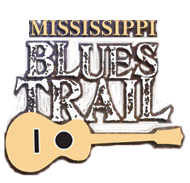The Enlightenment of W.C. Handy
The Enlightenment of W.C. Handy - Cleveland
In W.C. Handy’s famous account of his “enlightenment” in Cleveland, a ragged local trio was showered with coins after Handy’s orchestra of trained musicians had been unable to similarly excite the crowd. In early manuscripts of his book Father of the Blues Handy identified the leader of the trio as Prince McCoy, but when the book went to press in 1941 McCoy’s name had been removed. McCoy (c. 1882-1968) later led a popular orchestra in Greenville but never received public recognition for his role in inspiring Handy.
W.C. Handy, who became known as the “Father of the Blues,” had no intentions of composing and publishing blues when he arrived in the Delta in 1903. Stack Mangham, a member of Handy’s Clarksdale-based band, told folklorists Alan Lomax and John W. Work III in a 1941 interview: “When Handy came here his ambition was to write marches . . . he was going to be the March King, another John Phillip Sousa.” Handy (1873-1958) had heard embryonic and emerging forms of blues in his native Alabama and during his travels, but only in Mississippi did the music begin to affect him. He cited two events in particular: hearing a lone guitarist at the Tutwiler train station and witnessing the response to a trio’s performance at the old courthouse that stood at this site in Cleveland.
“My own enlightenment came in Cleveland, Mississippi,” Handy wrote in an early manuscript of his book Father of the Blues. “I was conducting the orchestra in a dance program when someone sent up an odd request. Would we play some of ‘our native music’ . . . later a second request came up. Would we object if a local colored band played a few dances? . . . We eased out gracefully as the newcomers entered. They were led by a long-legged chocolate boy called Prince McCoy, and their band consisted of just three pieces, a battered guitar, a mandolin and a bass. The musicians themselves were a sorry lot . . .They struck up one of those over-and-over strains . . . a kind of stuff that has long been associated with cane rows and levee camps . . . A rain of silver dollars began to fall around the outlandish, stomping feet. The dancers went wild. . . These boys had the stuff the people wanted . . . Folks would pay money for it . . .That night a composer was born, an American composer. Those country black boys at Cleveland had taught me something . . . My inspiration came from the sight of that silver money . . .” (In the final published text [1941], some of this wording was changed: most notably, McCoy’s name was erased.)
Stack Mangham recalled that Handy’s famous Memphis Blues, also known as Mister Crump, was “the same thing we heard that night in Cleveland.” In one manuscript Handy wrote, “McCoy used to play a piece called I’m a Winding Ball and I Don’t Deny My Name.” Windin’ Ball (aka Winin’ Boy Blues) was a tune associated with New Orleans jazz legend and onetime Biloxi resident Jelly Roll Morton, who said that Windin’ Ball was also his nickname in the early 1900s. McCoy was based in Greenville when Handy heard him but he also had Louisiana roots as a native of St. Joseph. He later moved to Winston-Salem, North Carolina, where he died in 1968. Some have speculated that Handy’s editor or publisher deleted McCoy’s name from the book because if Handy was to be the “Father of the Blues,” a conflicting claim might arise if he identified another still-living musician whose blues preceded his own.
McCoy’s trio is not the only one mentioned in discussions of the Cleveland dance. When John Quincy Wolf, a Memphis professor and folksong collector, interviewed some Cleveland old-timers in the 1960s, one recalled a young local trio featuring Willie Webb on guitar and musicians named Sherman on mandolin and “Snow” on bass.
content © Mississippi Blues Commission
[ BACK TO TOP ]

